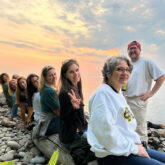Gates of the Arctic National Park and Preserve, located in the central Brooks Range of northern Alaska, is one of the last places in North America that is still untrammeled by modern civilization.
It features countless jagged mountains that soar anywhere from 4,000 to 8,000 feet high, numerous wild and scenic rivers, and more than seven million acres of federally designated wilderness.
In the brief period of summer weather from around mid-June through late July, the sun never sets. It allows the Brooks Range to transition from a grim winter wasteland to a vibrant landscape, teeming with vegetation, wildlife … and, of course, mosquitoes.

View from above a glacial lake in the Valley of Aquarius, Gates of the Arctic National Park, Alaska.
From May through September of this year, I worked as a backcountry ranger in this park. While the ranger station and my housing were located in Bettles, a bush town located about 30 miles south of the park, I spent about 60 days backpacking across the tundra and floating down the rivers within the park.
My patrols were far from aimless, so there was a bit of real work involved, but the experience was so astounding.
After nine backcountry patrols and hundreds of photos taken in a place of such inordinate grandeur, the finest memory of the season was a patrol in the Arrigetch Peaks. As a National Natural Landmark, the Arrigetch receives a considerable percentage of the park’s visitors each year.

Some of the prominent peaks of the Arrigetch. Steven Duby ’09 was consistently faced with “utterly horrifying beauty” throughout his summer as a park ranger.
Look at the photographs and it’s easy to see why.
In the Inupiaq language, the word “Arrigetch” is translated as “fingers of the outstretched hand,” and every year a few climbers from around the world try to ascend these fingers. After spending several days among these spires of rock, hiking deep into their glacially eroded valleys, I determined that no words of the English language can accurately describe the utterly horrifying beauty of this place.
You must see for yourself to gain a genuine understanding.
The summer also included an array of wildlife: grizzly bears just 100 yards away, black bears stumbling into camp in the morning and more than 100 Dall sheep grazing in the mountains.
While seeing a grizzly in the wild helps define a wilderness experience, perhaps even greater is the sight and sound of a wolf.
In late June, just after the solstice, I was fortunate to see a lone gray wolf roaming across the tundra, and on my final patrol, further south on the John River, I heard the howling of a dispersed pack late one evening; a perfect end to my season.
Since leaving New York not long after graduating from Oswego State, I have called Alaska my home. Working for Gates of the Arctic National Park and Preserve has allowed me to see a part of this vast state that few people ever visit. I hope to see more as my time here continues.
Former Oswego magazine intern Steven Duby ’09 is a graduate student at Alaska Pacific University in Anchorage, Alaska.
More from Last Word
The Last Word: Queer Eye for the Alumni
The Last Word: Queer Eye for the Alumni I am a queer alumnus (Class of '09!) who now teaches in the …
The Last Word
The Last Word Education Key to Creating Change Life is about the possibilities and obstacles. It’s what you do with the two …
The Last Word: Memories of My Alma Mater and My Mentor
The Last Word: Memories of My Alma Mater and My Mentor How does time race by all of us so quickly? …












